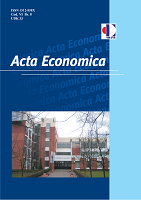ПРИВАТИЗАЦИЈА – КЉУЧНА КАРИКА НА ПУТУ ИЗ СОЦИЈАЛИЗМА У КАПИТАЛИЗАМ
PRIVATISATION – KEY LINK FROM SOCIALISM TO CAPITALISM
Author(s): Miodrag ZecSubject(s): National Economy, Economic policy, Political economy, Social development, Economic development, Socio-Economic Research
Published by: Економски факултет Универзитета у Бањој Луци
Keywords: Privatization; transition; socialism; capitalism;
Summary/Abstract: The transition process is multidimensional; the overall purpose being the social and economic re–arrangement with privatisation being a key factor. In essence, the transition involves the rejection of the bureaucratic economic model, the concept of state–owned property and state workers and, in it splace, the adoption of a market economy which is based on privately–owned property and a society founded upon a parliamentary democracy. In practice the transition process might be classified into three categories: First: the practice and procedure of the implementation of the transition process in other former communist countries were examined and the results analyzed; the objective being to focus on distinctive features requiring certain combination of both models that are already incorporated and the results of implemented processes. Second: models from ex–Yugoslav republics were analyzed and the overall success of the transition implementation process considered. Third: the privatization process in Serbia embraced various stages with very modest effects as a result of a lack of clear political determination to implement major changes. Previous regimes had subordinated institutional privatization to non–institutional organs who lacked the desire to disassemble party–affiliated state and adopt the concept of a democratic civil soCIEty based upon a market economy. Following the identification of deficiencies in the existing model one might suggest a general concept of a feasible privatization model based upon a compromise between conflicting social interests and the creation of a sustainable ownership economic structure, the purpose of which is the provision of a viable market economy and political democracy. The identification of a viable privatization procedure is the cornerstone upon which the stability and success of the transition process relies. Privatization, as a concept, is dependent upon key factors such as: state, citizens, workers, creditors and investors. Of course, the success of the transition process is determined by abolition of poverty re–distribution and the introduction of a growth of welfare state.
Journal: Acta Economica
- Issue Year: 2/2003
- Issue No: 1
- Page Range: 45-60
- Page Count: 16
- Language: Bosnian, Czech, Serbian

